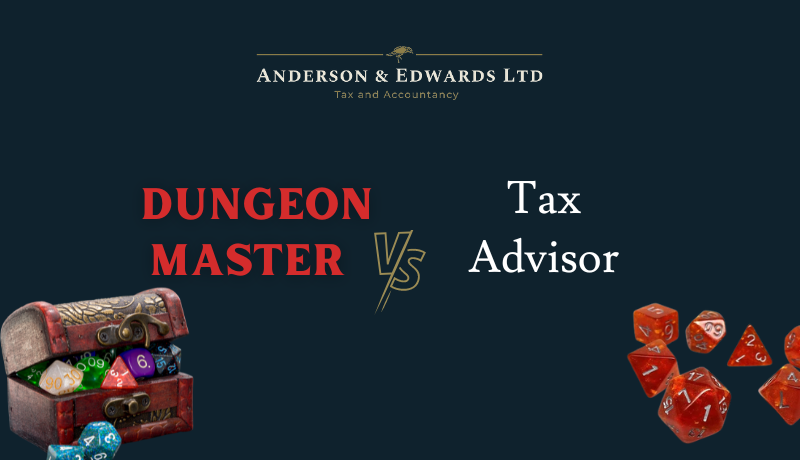
Tax advice and the infamous game Dungeons and Dragons (DnD) are not normally associated with each other. However, let us tell you why they are essentially the same concept whilst highlighting the impeccably similar and transferrable skill sets between the two.
If you’ve never played the game, Dungeons & Dragons is a fantasy tabletop role-playing game established in 1974. The players form an adventuring party who explore fantasy worlds together as they embark on epic quests and level up in experience. The Dungeon Master (also known as the DM) is the game's referee and storyteller. There's no winning or losing in D&D—at least, not in the conventional way.
Like a greedy mountain dwarf, let’s delve deeper into this hypothesis:
Let’s get the most obvious similarity out of the way - both a CTA and DM have to have a decent proficiency with numbers. Whether it’s adding up six, twenty-sided dice and applying multipliers, or knowing how much of the higher rate band is remaining after deducting various sources of income - numbers are their game, and knowing them well is a bonus. But it’s not for everyone. It’s bread and butter for both these roles though.
You can learn the rules all you want, but like a labyrinth with moveable walls, they are everchanging. New boosters, updates and political parties will mean you are never quite sure your previous knowledge can be relied upon.
Knowing the rules inside out is key to being a DM and managing the game. CTAs need to know tax legislation and stay on top of it extremely well to make sure the advice they are giving is by the book and up to date.
Not only that but learning how and where you can find the backup to your answers is an essential skill.
“You always do this…. Except when you don’t.”
In life and gaming, there are some general rules of thumb to fall back on: For DMs it’s ‘always round down’, and for CTAs, ‘your worldwide income and gains are taxable here as a resident’.
But a well-written double taxation agreement or a new-fangled spell description (FIREBALL!) will teach you that specific trumps general rules each and every time.
Not only do both have to know the rules well, but they also need to beware of the exceptions.
A CTA is working to external deadlines and organising client meetings. But, this is nothing compared to a DM herding players - an impossible and thankless task, if you’ve ever played the game.
Sometimes the rules are a grey area. Your clients or players typically want the most immediate and seemingly favourable outcome. It’s your job to produce the optimal outcome. But you must explain your own interpretation and why you are correct.
It’s hard to break the news that you’ve just been squished by a mountain troll (or the tax man) and that cloak of protection doesn’t work right now.
With all the tax legislation and exceptions, a CTA often has to translate what these mean for their clients, with the hope that they won’t hate the messenger.
So there you have it, maybe you’re a tax advisor that wants to do a bit of extra work in your downtime and mix in a couple of goblins and wizards. Or maybe you’ve played a bit of DnD and you fancy a bit of a career change?
It appears that following our hypothesis, it could easily be mistaken for the same job…
“And that’s the story of how they lived happily ever after….“
If you’re looking for a Chartered tax advisor that dabbles in being a Dungeon Master, then James might be your answer. We help clients in the gaming industry because we’re avid gamers, not because we are accountants. However, our day jobs do help when it comes to tax relief. Email us at Enable JavaScript to view protected content. or phone us on 0131 364 4191.
Alternatively, if you have no interest in DnD or gaming in general, we’ll try our best to understand and just work on your finances.
© 2025 Anderson & Edwards Ltd|Registered in Scotland SC678768|Privacy Policy|Website by Broxden